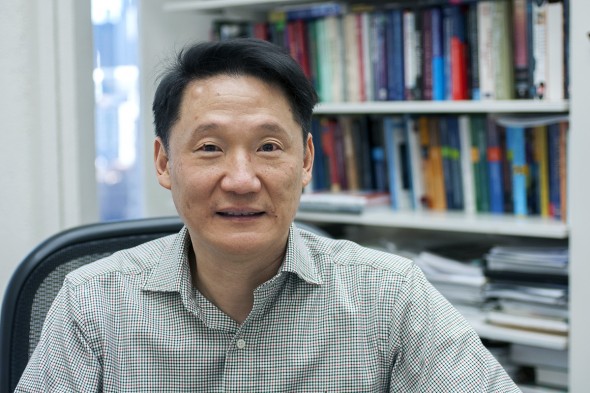Examining the impact of captured data
The Researcher of the Year award recognizes 10 UIC scientists who are advancing knowledge in their fields. The Distinguished Researcher Award honors five researchers with a record of outstanding achievement. The Rising Star Award honors early career researchers who show promise as future leaders.

Philip Yu: “You’re blogging, you’re chatting online, you’re posting pictures, even your bank activity, everything is being logged.” Photo: Joshua Clark/UIC Photo Services
Every recommendation from Netflix and Amazon, every optimized ad on Google, depends on data mining — identifying patterns, then using them to extract information from huge data sets.
“You’re blogging, you’re chatting online, you’re posting pictures, even your bank activity, everything is being logged,” said Philip Yu, distinguished professor of computer science, Wexler chair in information technology in the College of Engineering, and a Distinguished Researcher of the Year.
“It’s scary, isn’t it?”
Still, Yu believes, that captured data can be used for good, not evil.
For example, when you search for a movie to watch on Netflix, those recommendations can make it easier to find something to watch tonight.
In health care, the promise of data-mining is even greater.
Right now, medicine is relatively primitive, Yu said. People depend on their doctor’s experience to diagnose and treat their illness, but any one doctor’s experience with that particular illness may be limited.
Imagine looking at the records of millions — even tens of millions — of patients to find people with similar situations, and seeing what treatments got the best response, Yu said.
“This is data-driven medicine,” he said.
It may be possible to use big data sets to see patterns that warn us of dangers, preventing tragedies like the Boston Marathon bombing, he said.
“We discover knowledge from the data by finding patterns.”
Large companies like Walmart and Amazon have come to understand the enormous competitive edge their data gives them.
“If you have scale, you have more information on customers and know how to best serve them,” he said.
One of the world’s foremost experts on big data, Yu was recruited to UIC from IBM in 2008 for the endowed chair funded by Peter Wexler, bioengineering alumnus and pioneer in computer networking, and his wife, Deborah.
Of the change from industry to academia, Yu says, “We all do research, but here we have the opportunity to interact with young students.
“When they first come in, they don’t know how to do research, but by the time they graduate with their own Ph.D.s they have become mature researchers. It’s good to see the whole process.”
